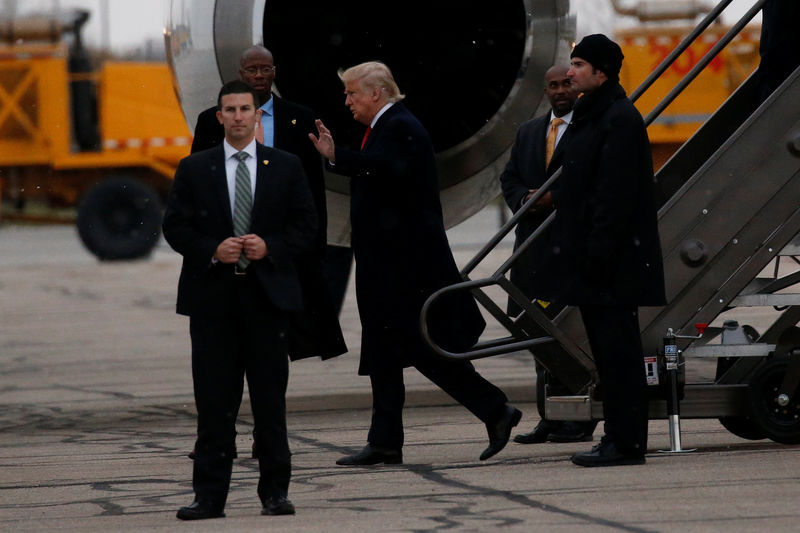By Mark Hosenball
WASHINGTON (Reuters) - President-elect Donald Trump is receiving an average of one presidential intelligence briefing a week, according to U.S. officials familiar with the matter, far fewer than most of his recent predecessors.
Although they are not required to, presidents-elect have in the past generally welcomed the opportunity to receive the President's Daily Brief (PDB), the most highly classified and closely held document in the government, on a regular basis.
It was not immediately clear why Trump has decided not to receive the intelligence briefings available to President Barack Obama more frequently, or whether that has made any difference in his presidential preparations.
An official on the transition team said on Thursday that Trump has been receiving national security briefings, including "routine" PDBs and other special briefings, but declined to specify their content or frequency, saying these matters were classified.
Trump has asked for at least one briefing, and possibly more, from intelligence agencies on specific subjects, one of the officials said. The source declined to identify what subjects interested the president-elect, but said that so far they have not included Russia or Iran.
Indiana Governor Mike Pence, Trump's vice president-elect, has been receiving his own PDB at least six days a week, the sources familiar with the matter said.
Former Central Intelligence Agency briefer David Priess, the author of a book about PDBs, said that traditionally, Trump and Pence's predecessors sat for "daily or near-daily intelligence briefings" between their elections and their inaugurations.
He said Jimmy Carter and Ronald Reagan did not start receiving their daily briefings until later in November, while the delayed election result in 2000 meant that George W. Bush did not start receiving his until December.
The briefings are not compulsory. Priess said that after his first election, Richard Nixon spurned face-to-face briefings, so paper PDBs were delivered to his office, only for a "stack" of them to be later returned to the CIA, unopened.
Trump's casual attitude to the briefings attracted criticism from Representative Adam Schiff, the top Democrat on the House Intelligence Committee.
"It is deeply disturbing that the president-elect has time for rallies but not for regular intelligence briefings," Schiff said.
During the run-up to the Nov. 8 presidential election, Trump and a handful of advisers received at least two briefings from intelligence officials about broad national security issues.
However, the pre-election briefings did not include the kind of secrets that are included in the PDBs that Obama, Trump and Pence now have access to. Such secrets include information about U.S. espionage sources and covert operations overseas.
PDBs are presented to presidents and their closest aides by representatives of the Office of the Director of National Intelligence (ODNI), though material in them is prepared by the CIA, the National Security Agency, the Defense Intelligence Agency and other parts of the U.S. intelligence community, the officials said.
During and after the election campaign, Trump raised questions about the intelligence on hacking of U.S. political institutions.
In a statement on Oct. 7, ODNI and the Department of Homeland Security expressed confidence that the Russian government had "directed" hacking into "emails from U.S. persons and institutions" that was "intended to interfere with the U.S. election process."
Trump, however, has repeatedly dismissed suggestions that Russia was behind the efforts, telling Time magazine earlier this week: "I don't believe they interfered ... It could be Russia. It could be China. And it could be some guy in his home in New Jersey."

(Corrects to say Iran, not France, in fifth paragraph)